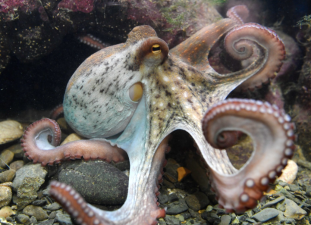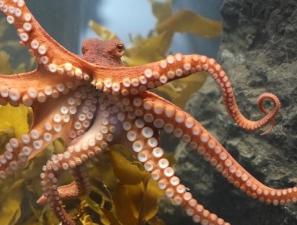There are two important reference standards for looking at the intelligence of an animal: brain-body ratio and number of neurons. Octopuses also have brains, and their brains are also in their heads. If we simply look at the ratio of the brain in the head to the body, the octopus will be weak, because the largest part of its body is actually its tentacles. However, one thing needs to be noted, that is, the intelligence of the brain is related to the number of neurons. Our human neurons are concentrated in the brain, but the octopus's brain actually has only 40% of neurons, and the remaining 60% of neurons are in its 8 tentacles.

The evolutionary history of octopuses
In the Mesozoic era, "cephalopods" dominated the seas at that time. They had symmetrical bodies, well-developed heads connected to their feet, and huge bodies. They preyed on fish, crabs, and shrimps at the bottom of the water.
Why didn't such a smart octopus reach the top of the food chain?
To figure out this problem, you can actually find out the reason by comparing octopuses with humans.
First of all, the number of neurons. No matter how many brains you have, the intelligence of your brain is determined by the number of neurons, because the more neurons you have, the more complex things you can store and process. Although the octopus has "9 brains", the number of its neurons is completely incomparable to that of humans.
The total number of neurons in the octopus is about 500 million, which can indeed kill many invertebrates in seconds, and it is also comparable to vertebrates (for example, fish only have about 100,000), but if it is placed in mammals, it will not look good, because even cats have about 800 million neurons in their brains. If it is increased, it will be even less impressive among primates, such as squirrel monkeys, which have 3.3 billion neurons.
As the smartest primate, humans have as many as 8.6 billion to 10 billion neurons, which is 20 times that of octopuses. It can be seen that the intelligence of octopuses is relative and depends on the reference.
Since the number of neurons of octopuses is less than that of cats, their IQ only stays at using existing tools, which is far from being able to make various tools by themselves like humans. It is obviously impossible to reach the top of the food chain just by using shells for self-defense and escaping from some complex devices.

The second is survival habits. Humans have also slowly come to today from the bottom of the food chain. Needless to say, in the Australopithecus period, Australopithecus was often hunted by saber-toothed tigers. In addition to the continuous evolution of the brain, the survival habits of living in groups are also crucial for humans to come to today step by step.
Octopuses are solitary animals. Except for the short-term togetherness of males and females during the breeding season, they usually live alone. Such survival habits are not very useful even if they are smart.
Size and aggressiveness. If an animal wants to become a species at the top of the food chain, they either have a smart brain, such as humans, or have a size advantage, such as hippos, or have strong aggressiveness, such as lions and tigers.
Let's look at humans again. In addition to having a smart brain and the habit of living in groups, humans are also quite aggressive. Although humans don't have sharp claws or fangs, their flexible limbs can be combined into some lethal moves, such as throat locks, guillotines + knee strikes, elbow strikes, etc. These fighting moves are very lethal as long as they hit vital points.
Summary
The intelligence of octopuses is so high that it is incomprehensible. The reason why this statement is true is that among invertebrates, it is difficult for people to imagine that such smart creatures exist.
